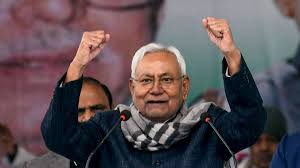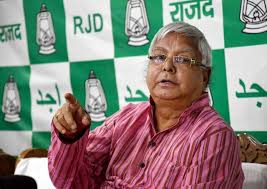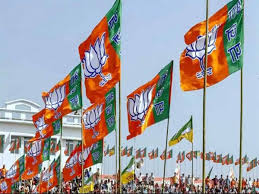The growing influence of backward classes in Bihar politics can put a damper on Hindu politics…
 NEW DELHI: The caste-based survey in Bihar (2022) has changed the political and power dynamics of the state. As the assembly elections are approaching, it seems that all the castes are rapidly rallying around the two major alliances in the state. The alliance of the Narendra Modi-led National Democratic Alliance (NDA) with Nitish Kumar’s JDU is a message that the NDA has its eyes on the 63 percent backward population of the state. Bihar has become the first state to release the data of the caste survey.
NEW DELHI: The caste-based survey in Bihar (2022) has changed the political and power dynamics of the state. As the assembly elections are approaching, it seems that all the castes are rapidly rallying around the two major alliances in the state. The alliance of the Narendra Modi-led National Democratic Alliance (NDA) with Nitish Kumar’s JDU is a message that the NDA has its eyes on the 63 percent backward population of the state. Bihar has become the first state to release the data of the caste survey.
Rahul Gandhi has assured to be the well-wisher of the backward classes by promising to conduct the caste-based survey across the country. However, the government has not yet released information about the socio-economic status of the people included in the survey.
Backward and extremely backward caste voters in Bihar politics can play an important role in the upcoming elections. The role of the extremely backward class during elections in the state becomes special because their population is the highest. They are in a position to play a decisive role in politics. Like the Lok Sabha elections, its effect can also be seen in the assembly elections. The Bharatiya Janata Party strongly opposed this decision of the Nitish government in the Supreme Court, saying that the state does not have the right to conduct caste census. Seeing its effect, the tone of the saffron party has changed.
Extremely Backward Classes (EBC) and Other Backward Classes (OBC) together make up about 63% of Bihar’s population of 13 crores, making them the largest caste group in the state. This is the caste group that has been looking at its future in the mirror of pitchers for more than three decades. But the large scale public support that Prashant Kishore’s Jan Suraj Party is getting gives an impression that his party can pose a challenge to both alliances in the assembly elections.
The Congress party is also attracted by the caste-based census. After the census data was released, Leader of Opposition in Lok Sabha Rahul Gandhi wrote on the social platform X, “The caste census of Bihar has revealed that OBC + SC + ST are 84% there. Out of 90 secretaries of the central government, only 3 are OBCs, who handle only 5% of India’s budget. Therefore, it is important to know the caste data of India. Our pledge is that the more the population, the more the rights.” During the Karnataka elections, Rahul Gandhi also gave a slogan – “The more the population, the more the rights.” With this slogan, Rahul Gandhi said that if we want to give strength to the OBCs, then first we have to understand how many OBCs are there in the country.
The effect of caste upsurge was seen in the recently concluded Lok Sabha elections. Nitish Kumar’s Janata Dal (United) also got the benefit of contesting the elections in alliance with the BJP-led NDA. This alliance has shown the influence of backward classes in the state politics by winning 30 out of 40 seats in the state. Caste upsurge
has changed the equations of politics. The survey has set the stage for significant changes in reservation policies and welfare programmes, but it has also enthused the RJD and the JD(U), which have been ruling over a population of 13 crore for the past 33 years on the back of backward politics rather than the need to develop the state and improve the well-being of the people. The open support of the All India Alliance has put the BJP on the defensive. The BJP, which had vehemently opposed the survey even in the Supreme Court, has toned down its tone after the survey.
After this year’s shocking election results, the BJP has also joined the race to woo the backward classes. In view of the elections in Haryana later this year, the BJP has increased the creamy layer limit for OBCs from Rs 6 lakh to Rs 8 lakh, which also excludes salary and agricultural income. Obviously, the BJP had to suffer the consequences of division of the Hindu vote bank on the basis of caste in Uttar Pradesh, which reduced its seats from 62 to 33 in the 2024 Lok Sabha elections. BJP is now arguing in favour of caste census.
A senior IAS officer of Bihar cadre posted at the Centre said that Bihar is a state on the map of the country where politicians and officers dream of their caste as a character even in their dreams. He says- The caste system has traditionally had a significant impact on people’s access to power.
But Nitish Kumar had to face embarrassment when the Centre did not give importance to the demand for special status for Bihar. This is an old issue of Janata Dal (United). Union Finance Minister Nirmala Sitharaman completely ignored it in the budget presented. NDA alliance partner Nitish Kumar’s nationwide caste census also did not find a place in the budget. Narendra Modi’s government has shut Nitish’s mouth by giving Bihar a package of Rs 2,600 crore for expressways, economic corridors and power plants. Nitish is trying to look happy with this. But is he really happy..?
Nitish’s government, apprehensive of its falling graph in state politics, has made a strategic attempt to save its political existence by issuing a notification to conduct its own caste survey in the state in June 2022. RJD chief Lalu Prasad said “Jiski jitni sharta, utni sharta.”
Political analyst Naval Kishore Chaudhary said in Patna, the caste survey report will be a major factor in the upcoming elections in the country and the state.The caste survey report will weaken “Hindutva forces” in the upcoming election in the state and no party can ignore it now.”
Social scientist Sunil Kumar Sinha estimates that this could revive Mandal vs Kamandal (backward vs forward) politics in the state. Sinha says – Upper caste and Hindutva groups are also concerned about the potential impact of the caste-based census on their political alliances and agendas.
The caste-based census could disrupt this narrative by highlighting different socio-economic conditions and inequalities among different caste groups, thereby shattering the notion of a homogenous Hindu vote bank. In addition, upper caste and Hindutva groups fear that the caste-based census could re-establish political mobilization by giving voice to historically marginalized communities. The opposition of this group stems from the fear of losing socio-economic privileges, eliminating their historical gains and the potential disintegration of their political alliances and agendas.
 Rabindra Rai, who understands the politics of backward classes in Bihar, says “Hindutva and upper caste groups fear that this census will disrupt their ‘Hindu’ narrative. “Unity” project can be weakened by accurate data. Accurate data can potentially challenge the narrative of a universal Hindu identity. Caste equations have dominated politics in Bihar to such an extent that for the last seven decades, this state has been continuously lagging behind on the scale of development. Despite that, politics has revolved around caste. For the last 33 years, there have been governments of backward classes in Bihar, which have been led by Lalu family or Nitish Kumar.” While CSDS professor and political analyst Sanjay Kumar says – Most of the regional parties of the country are in support of caste census, this is because their vote base is based on OBCs.
Rabindra Rai, who understands the politics of backward classes in Bihar, says “Hindutva and upper caste groups fear that this census will disrupt their ‘Hindu’ narrative. “Unity” project can be weakened by accurate data. Accurate data can potentially challenge the narrative of a universal Hindu identity. Caste equations have dominated politics in Bihar to such an extent that for the last seven decades, this state has been continuously lagging behind on the scale of development. Despite that, politics has revolved around caste. For the last 33 years, there have been governments of backward classes in Bihar, which have been led by Lalu family or Nitish Kumar.” While CSDS professor and political analyst Sanjay Kumar says – Most of the regional parties of the country are in support of caste census, this is because their vote base is based on OBCs.
Sunil Kumar Sinha says “Unemployment rate in Bihar has reached 18.8%. After Jammu and Kashmir and Rajasthan, Bihar is at number three in terms of highest unemployment rate. Industry in the state is negligible. 30 to 35% of the state’s GDP still consists of the money sent by people working outside Bihar. For nearly 12 years, the BJP has also been a part of the Nitish government in Bihar. Therefore, the BJP cannot run away from questions related to the plight of Bihar”. “The BJP has always called for ‘samrasata’ or harmonious stability, and not ‘samajik nyaay’ or social justice. For OBCs and Dalits, its effort has been to accommodate, but within the framework of Hindutva. Such a huge gap between their numbers and share in power challenges ‘accommodation’. The demand for justice becomes difficult to suppress.
This year, the BJP was at the forefront of demanding an end to reservation for Muslims, tried to fuel communal divide by making it ‘Muslim versus everyone else’ and even approached the Supreme Court to justify the need to end reservation for Muslim backward classes. The Supreme Court bench asked tough questions, due to which the former Basavaraj Bommai government of Karnataka had to put a halt to its policy.

